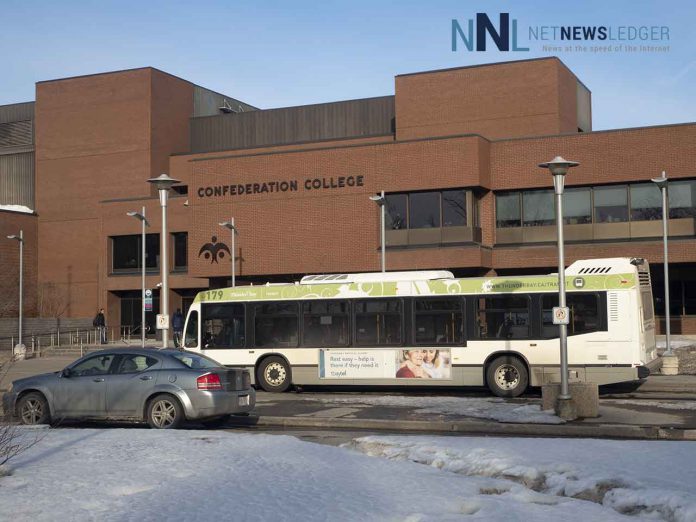Thunder Bay – The Ontario government has made agreements with public colleges and universities that will revolutionize the province’s public postsecondary educational institutions.
The move will help students get the education, skills and experience they need to find good jobs by ensuring postsecondary institutions offer programs that align with labour market demands.
“Our government believes in making institutions accountable for student success,” says Ross Romano, Minister of Colleges and Universities. “That’s why we are making sure Ontario’s publicly-assisted postsecondary institutions have a clear mandate that is focused on meeting the needs of students and equipping them to succeed in rewarding careers.”
In a statement issued by the Minister, “Ontario recognizes that students and their families make tremendous sacrifices to attend college or university, and they make these sacrifices in order to find stable, high-quality jobs. Under the previous funding agreement, however, students were graduating with world-class degrees but were finding it difficult to secure stable employment in their field of study. The previous system was not working for students and needed to be driven by results.”
What is Changing?
Under the new proposal, funding for Colleges and Universities will be tied to the post-graduation job success of students.
The agreements, which are in effect from 2020-2025 introduce a new ‘made-in-Ontario’ performance-based funding model that places a higher weighting on student and economic outcomes. Previously 1.4 per cent of a university’s funding and 1.2 per cent of a college’s funding was tied to academic performance.
The Ford Government say that “By tying a portion of government funding to performance, Ontario is encouraging institutions to focus on their institutional strengths, to ensure that students and graduates have the real-world skills they need for rewarding careers.”
“Placing a greater emphasis on outcomes will encourage colleges and universities to be more efficient and specialized, and to focus on what they do best,” said Minister Romano. “The new agreements will also encourage transparency and accountability by ensuring that the spending of public dollars results in positive economic outcomes for Ontario.”
The new Strategic Mandate Agreement will come into effect for the 2022-2023 academic year, as the Ontario Government works with post secondary institutions navigating through the COVID-19 pandemic.
The 10 metrics included within the new SMA include:
- Graduate employment earnings
- Experiential learning
- Skills and competencies
- Graduate employment rate in a related field
- Institutional strength/focus
- Graduation rate
- Research funding and capacity for universities, and apprenticeship-related for colleges
- Research funding from industry sources/funding from industry sources
- Community/local impact of student population
- Economic impact (institution-specific)
Canadian Federation of Students Oppose Plan
“Students have repeatedly voiced concerns about shifting to a performance-based funding model,” said Kayla Weiler, Ontario Representative of the Canadian Federation of Students, “as the pandemic leaves students facing an unrecognizable job market, it is more reckless than ever to move towards a plan that ties post-secondary funding to indicators like post-graduation employment.”
The CFS says, “Tying the majority of post-secondary funding to arbitrary metrics set out by the performance-based funding plan will have a negative impact on academic autonomy, diversity of research and interdisciplinary studies. This plan will pressure colleges and universities to prioritize fields of study that produce higher wage earning workers. The mission of post-secondary institutions is to provide higher education. Performance-based funding will compromise academic freedom and disrupt collegial governance as institutions will be more likely to be influenced by corporate or private interest in exchange for increased funding.”
There are concerns that programs like arts, music, and history and social sciences could be heavily impacted.
Plan Opposed by OPSEU
“We all know that efficiencies is a code word for front-line cuts and lower-quality programs,” said OPSEU First Vice-President/Treasurer Eduardo (Eddy) Almeida. “And basing funding on graduate earnings has an implied bias towards larger post-secondary institutions giving those schools a home-field advantage where jobs are more plentiful.
“What will happen to programs for ‘caring professions’ like DSWs and PSWs where the salaries tend to be lower. And how will these metrics apply to international students?”
OPSEU/SEFPO President Warren (Smokey) Thomas says the government’s plan to change the way colleges are funded will lead to lower-quality education, job cuts, and the outright disappearance of essential programs throughout the province.
“Just like Walmart decimated the main streets of so many Ontario communities and the livelihoods of so many workers, this plan will destroy Ontario’s beloved college system,” said Thomas. “The Minister is forcing the colleges to focus on fighting each other instead of providing the best education to as many students as possible.
“Smaller colleges will be under tremendous pressure and students will suffer, especially those interested in social services and other fields where salaries tend to be lower and where demand, as witnessed by this pandemic, is high,” said Thomas. “Fortunately, this disastrous plan doesn’t take effect for two years. That’s two years for the government to listen to reason and reverse course on this ham-fisted attempt to compare academics to an athletic playing field.”
OPSEU say that “The plan, announced by Minister of Colleges and Universities Ross Romano, proposes to change the way colleges are funded. Currently, they receive funding based on enrollment. But under the new plan, the bulk of their funding will be contingent on a set of “metrics”, including efficiencies and the amount students earn after graduating.”
Almeida also noted that collecting data for the metrics will add red-tape expenses that would be better spent in classrooms.
Thomas expressed concerns about the plan’s heavy focus on what are known as “micro-credentials,” which are generally short-term and heavily specialized.
“There can be a place for micro-credentials, but all too often they’re just about providing training for precarious gig work,” said OPSEU/SEFPO College Faculty Division Chair RM Kennedy. “Our colleges and universities are meant to give students a broad understanding of an industry so that they can go out and build a decent career. But a system based on micro-credentials just sets them up for a life struggling from one part-time contract to the next.”
“We’re calling on the presidents of the 24 colleges to join us in expressing their opposition to this ill-fated plan,” said Thomas. “Minister Romano needs to be acutely aware of his pay for performance plan. From our experience with his office, this may come back to haunt him and his political staff one day. I’d hate to see his ministry disappear altogether.”







